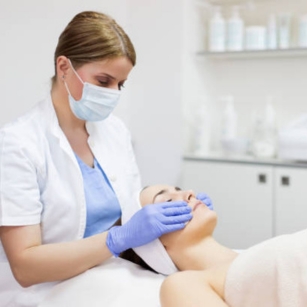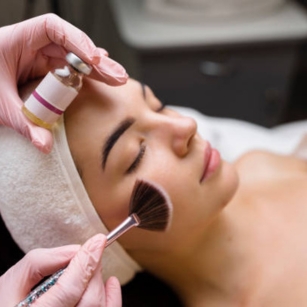
- By Dr. Ravali Yalamanchili
- 2023-08-14
Everyone's hair is a little different. Hair comes in a variety of colours, lengths, and styles. Some people have heads full of healthy, thick hair, while others have thinning hair or bald spots/patches. Hair loss can be quite distressing, and it can have an influence on one's self-esteem. If you are experiencing extensive hair fall or hair loss, the good news is you have multiple options to deal with your concern, depending on your hair type. Keep reading about hair fall treatment options available for your hair type with the valuable information shared by hair fall doctor and dermatologist in Hyderabad, Dr. Ravali Yalamanchili, at Neya Dermatology & Aesthetics. But, before diving straight into the hair fall treatments, let’s learn how to determine hair type, the different hair types, and the cause of hair fall.
How to determine someone’s hair type?
Identifying someone's hair type is an important first step in determining how to care for someone’s hair. For people who are unsure about the type of hair they have, consider the following:
See the natural texture of the locks: Wash hair without using any personal hair care products and air dry them. If in doubt, place a strand of hair on a flat surface. Coily hair has tight spirals or Z-shaped curls; curly hair has looser spirals; wavy hair has gentle S-shaped curls; and straight hair has no curls.
Check how hair behaves when wet: Coiled and curly hair, for example, has curls even when wet. Straight and wavy hair looks straight when wet.
Examine the amount of oil produced by the scalp: Individuals with oily scalps may have straight or wavy hair. If their scalp is normally dry, they may have curly or coiled hair.
Consult a hairdresser or a hair care specialist in Hyderabad: If you still need clarification about hair type, then ask a stylist or hair care professional.
Remember, hair type can change: Hair type can change with age, diet, and hormonal fluctuations. So keep an eye on the condition of the hair and change your personal hair care routine as necessary to guarantee that the locks look and feel as good as possible.
Here is a Small Guide on Different Types of Hair by Dr. Ravali Yalamanchili, a hair fall doctor in Hyderabad practising at Neya Dermatology & Aesthetics.
1. Straight Hair
Straight hair is difficult to curl and falls flat from the roots to the ends. Usually, it is smooth and silky. Women with this hair type typically have oily scalps, which makes their hair greasy all throughout. Many of us believe that straight hair is simple to maintain and does not require much maintenance. But, in reality, straight hair can quickly become greasy and requires just as much care as other hair types.
Straight hair concerns
The most annoying aspect of straight hair is its lack of volume. Even when it is cut short, it flattens.
- Naturally straight hair is mostly thin which means that as people age, they will most likely lose their hair soon.
- Straight hair looks lifeless and flat. When it comes to hairstyles, straight hair is boring.
2. Wavy Hair
It falls somewhere between straight and curly. As wavy hair grows from the roots to the ends, people can notice silky, large curls. This hair type has a harsh texture, so wavy hair can keep hairstyles in place. So, if a person wants to straighten, curl, or style their hair in any way, this is the most handy and accessible hair type to try with.
3. Curly Hair
This hair type can be identified by pronounced curls from the roots down. Curly hair is more dry and frizzy than straight or wavy hair.
Curly and Wavy Hair Issues
Curly and wavy hair is regrettably prone to a variety of issues if not properly cared for, including those affecting hair appearance and health. Some of the most prevalent hair care problems are:
- Dryness: Curly hair is prone to dryness along its length.
- Breakage: There are twists and turns in naturally curly hair strands. They are more delicate and prone to damage and breakage.
- Damage: Heat or chemical treatments done on hair and rough detangling can quickly damage hair cuticles.
- Tangles: Curly hair is textured such that it can easily tangle if not properly protected.
- Frizz: Curly hair does not lay flat and smooth like straight hair. The natural shape of the strands can generate frizz. Frizz is natural in curly hair, but severe frizz can suggest problems, including dryness and breakage.
- Build-up: Hair products, minerals in water, and pollutants can all cause build-up on the scalp and curly hair.
Causes of Hair Fall in all Hair Types
- Hereditary hair loss: Male pattern baldness, which forms the characteristic "U-shape" balding patch on the scalp, is men's most prevalent cause of hair loss.
- Stress-induced hair loss: Malting can be caused by chronic stress. A stressful incident or a severe systemic infection might cause more hairs than usual to exit the development phase and enter the shedding phase of the hair growth cycle at the same time. This stress-induced hair loss condition is known as Telogen Effluvium.
- Traction alopecia: Many people with long hair constantly keep their hair tugged into a tight style. This includes defensive hairstyles as well as the simple act of tying a hair bobble too tightly when making a ponytail. Even if the hair isn't going out at the root, broken hair strands can indicate inflammation of the hair follicles.
- Iron deficiency: Low ferritin levels can be caused by heavy menstrual periods and vegetarianism. Ferri-tin plays a role in hair cell protein production and is stored as iron in the body. Low ferritin and iron levels are one of the most prevalent mineral deficiencies in young women with hair loss.
- Ignoring the scalp: Scalp health is critical to hair growth, especially in light of increasing levels of pollution and rising reliance on dry shampoo, which produces a paste-like mixture of dead skin and oil and is a primary source of scalp congestion. Any type of blockage or build-up on the scalp can suffocate the hair cuticle, preventing it from breathing. As a result, the hair may not grow to its full potential.
- Vitamin deficiency: Vitamin B12 and D deficiency are relatively common in people with hair loss. Reasonable dietary Vitamin B12 can only be derived from animal products, which is why vegetarians and vegans are prone to Vitamin B12 deficiency.
Vitamin D deficiency is on the rise because the skin produces 85% of it when exposed to sunlight. As people have become more aware of sun exposure, they have learned to cover themselves, seek shade, and apply high SPF to avoid sun tanning or damage. This has resulted in a rise in Vitamin D insufficiency rates.
If one is looking for the best hair loss treatment in Hyderabad, one can consult hair fall expert Dr. Ravali Yalamanchili at Neya Dermatology & Aesthetics.
She advises her patients with the best hair fall solutions that help reverse hair loss and promote new hair growth.
Hair fall treatment in Hyderabad by Dr. Ravali Yalamanchili
Growth Factor Treatment for Hair Loss
Growth Factor Treatment (GFC) is a non-surgical hair restoration technique in Hyderabad that is best applied to treat thinning hair and delay or stop the course of hair loss. Plat-el-et rich pla-s-ma has abundant natural growth factors that encourage natural hair growth. The therapy involves injecting growth factors into the thinning or balding areas of the scalp.
GFC treatment can treat both male and female pattern baldness and different types of alopecia by stimulating the growth of existing hair follicles, making hair appear thicker and healthier without the need for surgery.
Since hair loss is often caused by a lack of cell renewal in the scalp, GFC is an excellent therapeutic option because it improves blood circulation to hair roots and stimulates the production of new, healthy cells. It offers safe and consistent results and has a relatively short recovery period. Only a small amount of blood is drawn, as if patients were undergoing standard blood tests, and local anaesthesia is administered, so they feel very little discomfort. GFC hair fall control treatments are highly effective and highly successful.
To know more about hair fall treatment in Hyderabad, Consult Dr. Ravali Yalamanchili, best hair fall doctor in Hyderabad.
Benefits of Growth Factor Treatment
- Fuller, healthier-looking hair
- Hair regrowth has significantly increased.
- The formation of new healthy cells
- Hair dystrophy and burning or itchy feelings are reduced.
- Can be used to treat alopecia areata (AA) safely and effectively.
Mesotherapy Treatment for Hair Loss
Mesotherapy is a non-invasive method in which superficial microinjections are administered into target tissues just beneath the epidermis. "Meso" refers to the skin's mesoderm or middle layer. Mesotherapy is a procedure that stimulates the mesoderm, thereby alleviating a wide range of symptoms and diseases.
The injectable solution may comprise a variety of minerals, vitamins, amino acids, nucleic acids, and co-enzymes that can be adjusted to each patient's specific needs.
Mesotherapy for hair loss has a high success rate. When performed professionally, the procedure is virtually painless and safe. There is no need for a dressing or local anaesthesia. One can return to work immediately after the treatment. Mesotherapy is currently known to be as successful as, if not more effective than, pills in terms of hair regeneration and restoration.
Mesotherapy delivers precisely the correct ingredients to the exact location where they are required (around the hair follicle) so that:
- The hair follicle can grow and thrive.
- D-H-T (dih-ydrot-estoster-one) excess is neutralised, and
- Blood circulation is increased.
Microneedling + GFC
Microneedling is a therapy that involves repeatedly perforating the skin on and around the scalp with a mechanical microneedle pen. This procedure causes a series of micro-wounds that stimulate the body's growth processes, producing collagen. Collagen then starts to heal the tissue surrounding the hair follicles. This treatment promotes hair regrowth by encouraging skin tissue regeneration, creating a healthier environment for hair follicles.
A GFC injection contains a concentrated amount of plat-el-ets delivered to areas of insufficient blood flow. Pla-tele-ts then form clots and produce signalling molecules known as growth factors, which direct the body to spend energy and resources healing the injured area.
While these two therapies are reasonably effective on their own, they really excel when combined. Microneedling causes the release of growth factors in and around the scalp, effectively priming pla-tel-ets and s-t-em cells in the pl-as-ma to work more quickly.
While growth factors are naturally generated, having more in abundance near the target locations for cellular regeneration can accelerate healing and recovery.
These therapies are appropriate for treating a wide range of hair loss conditions. Even when combined, these procedures are low-risk, non-invasive, and painless. The benefits are outstanding because the skin is fully rejuvenated, giving hair follicles a fighting chance to do their job.
Neya Dermatology & Aesthetics is one of the best hair loss treatment clinics in Hyderabad, offering treatment for all types of hair loss and baldness for all hair types.
If one is looking for a heavy hair fall solution, hairline receding treatment, monsoon hair loss treatment, and other healthy ways to learn how to reduce hair fall for men and women and hair fall treatment cost in Hyderabad, then one can consult the hair loss experts in Hyderabad at Neya Dermatology & Aesthetics.
Content Reviewed and Updated by Dr. Ravali Yalamanchili on 15th July 2024




